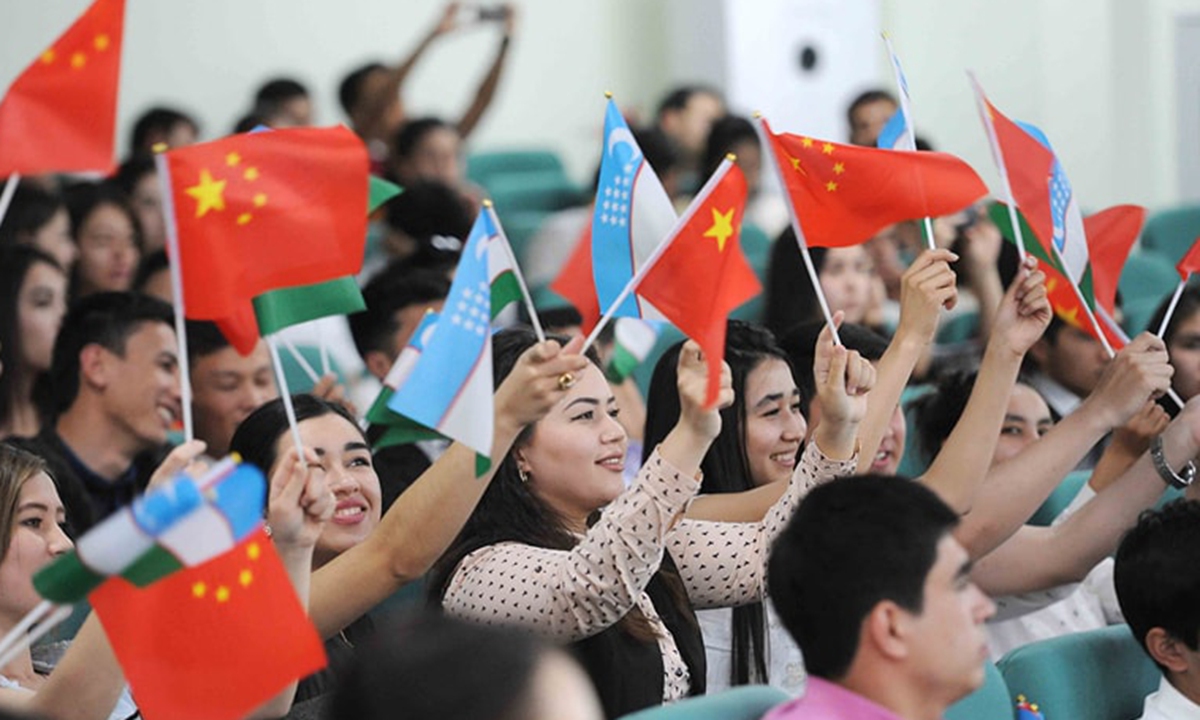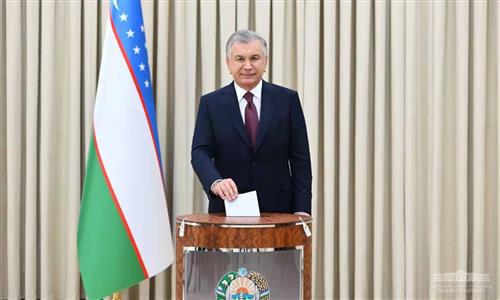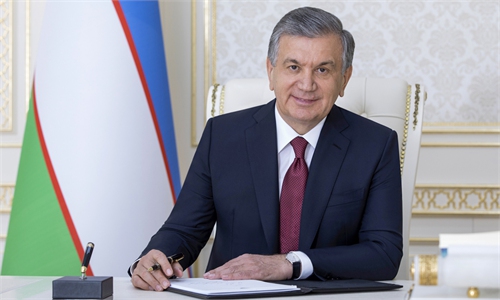China, Uzbekistan upgrade bilateral ties
Relations ascend to new level with increased cooperation in traditional, new sectors

Students in Tashkent wave Chinese and Uzbek national flags. Photo: Courtesy of Uzbek Embassy in China
China and Uzbekistan upgraded bilateral ties to an all-weather comprehensive strategic partnership for a new era on Wednesday during talks between Chinese President Xi Jinping and his Uzbek counterpart, Shavkat Mirziyoyev, in Beijing.
Experts noted that as China and Uzbekistan's relationship has entered a new level, the two will see increased cooperation in both new and traditional sectors. Moreover, the turbulent international society highlights the urgency of stepping up security collaboration between China and Uzbekistan, as well as other Central Asian countries.
Xi pointed out that 32 years ago, Uzbekistan took the lead among Central Asian countries in establishing diplomatic relations with China. The two peoples have inherited the spirit of the Silk Road, and the friendship between China and Uzbekistan has deep roots and flourishing vitality.
Building a more meaningful and dynamic China-Uzbekistan relation is the common aspiration of the two peoples, Xi said. Both sides should take the development of the all-weather comprehensive strategic partnership for a new era as an opportunity to build a solid foundation for the community of a shared future between China and Uzbekistan with high-level political mutual trust, and to promote their respective modernization endeavors through high-quality joint construction of the Belt and Road Initiative (BRI), he noted.
Xi emphasized that the China-Uzbekistan relationship is good because both sides have always treated each other with sincerity and trust. Faced with the current complex international situation, both sides should firmly support each other. China firmly supports Uzbekistan in safeguarding national sovereignty, independence and territorial integrity, and firmly supports Uzbekistan in independently choosing its development path.
For his part, Mirziyoyev said that he hopes this visit will be an important opportunity to further strengthen mutual trust, expand comprehensive cooperation, and promote high-quality joint construction of the BRI. Mirziyoyev said he hopes to achieve more fruitful results in practical cooperation in various fields such as economy and trade, agriculture, green energy, local development, tourism and people-to-people exchanges.
The elevation of bilateral ties signals that China's relationship with Uzbekistan has entered a new era, Zhao Huirong, an Eastern European studies expert from the Chinese Academy of Social Sciences, told the Global Times. Zhao noted that the Uzbekistan president's visit reveals the great importance he attaches to ties with China.
Another dimension to Mirziyoyev's visit is to promote cooperation, especially after the China-Central Asia Summit last year. China's cooperation with Central Asia has now expanded, and there is vast potential for cooperation, Cui Heng, an assistant research fellow from the Center for Russian Studies of East China Normal University, told the Global Times. He noted that there are several projects being carried out between China and Uzbekistan, including the promotion of the China-Kyrgyzstan-Uzbekistan railway, and this visit serves to push them forward.
Cui said that as Central Asian countries are undergoing an energy transformation, they are eyeing cooperation with China, a leading country in green transformation, to help them speed up the process.
Chinese Commerce Minister Wang Wentao met with Jamshid Khodjaev, Deputy Prime Minister of Uzbekistan on Tuesday. Wang said that in 2023, China and Uzbekistan achieved a record high in bilateral trade volume, with China being Uzbekistan's largest trading partner for many years. Uzbekistan has become a hot investment destination for Chinese companies.
Wang vowed to deepen cooperation in areas such as energy, mining and infrastructure, and expand new growth points in cooperation in green energy, digital trade and cross-border e-commerce.
The Asian Infrastructure Investment Bank (AIIB) signed a three-year project investment plan with Uzbekistan on Wednesday, media reported. According to the AIIB, the investment plan covers sectors including transportation, energy, water resources and the environment, and will provide financial support for the development of multiple areas in Uzbekistan.
Mirziyoyev visited China twice last year, once for the China-Central Asia Summit and later for the third Belt and Road Forum for International Cooperation.
According to Zhao, Uzbekistan places significant emphasis on the Belt and Road Initiative proposed by China. This initiative has proven instrumental in transforming Uzbekistan's landlocked status into a strategic advantage, positioning it as a pivotal transportation hub in Central Asia. Uzbekistan has effectively become a crucial bridge, facilitating connectivity between China, Europe, the Middle East and South Asia.
Ahead of his visit this time, Mirziyoyev published a signed article in the Global Times on Monday with the title "Uzbekistan and China: millennia-long friendship and cooperation." He wrote, "The development of multifaceted relations with China has been, and remains, one of the main priorities of Uzbekistan's foreign policy."
Cui observed that Central Asia has become a focal point in the ongoing power struggles among major nations, such as the US, Russia, India and Turkey, who are all vying to strengthen ties with countries in the region. This emerging trend holds both opportunities and potential risks for the Central Asian nations, according to Cui.
In September, US President Joe Biden met with the leaders of Kazakhstan, Kyrgyzstan, Tajikistan, Turkmenistan and Uzbekistan on the sidelines of the United Nations General Assembly. Biden described this meeting of the C5+1 diplomatic platform - held for the first time at this level - as "a historic moment, building on years of close cooperation."
At the time when conflicts and crises are mounting, Central Asia, located in a zone of volatile geopolitical competition, attaches growing importance to security, said experts.
Cui noted that China's security values have special appeal and deeply resonate with Central Asian countries. Those countries hope to align their security needs with China's security needs. In this sense, Central Asian countries hope to step up collaboration on security with China, according to Cui.


